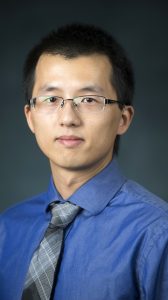OXFORD, Miss. – Skilled at 3D and 4D printing, Yiwei Han, assistant professor of mechanical engineering, is bringing that expertise to the University of Mississippi to establish a new 3D-printing laboratory.
Han’s research interests are micro/nano fabrication, additive manufacturing, advanced manufacturing and printing electronics. The mechanical engineering department is looking for a space for the lab, and he hopes to finish the lab setup by the end of June, he said.
Han’s graduate students and other students interested in his research will be able to use the lab, which will house a 3D printer customized for high-resolution 3D and 4D printing and eventually be used for additive manufacturing courses.
“My short-term goals are setting up my lab, publishing high-quality journal papers, seeking external funding and developing additive manufacturing courses for the students,” Han said. “My long-term goals are becoming a recognized researcher and educator and making contributions to the ME department, Ole Miss and our communities.”
Han has already proven to be a great asset to the department’s faculty and students, said Arunachalam Rajendran, chair and professor of mechanical engineering.
“I expect Dr. Han’s expertise on the design principles of 3D and 4D printing will lead to new electives and undergraduate research opportunity for our students,” he said. “Dr. Han is establishing a new 3D-printing laboratory to conduct hands-on experiments related to next-generation research and technology area(s) in engineering.
“He also brings his state-of-the-art research skills in 3D printing leading to extramural, external research funding and collaborative research with both Ole Miss, other universities and industries.”
The 3D-printing process builds a three-dimensional object from a computer-aided design, or CAD, model, usually by successively adding material layer by layer, which is why it is also called additive manufacturing.
Conventional machining, casting and forging processes involve either material being removed from a stock item (subtractive manufacturing) or poured into a mold and shaped by means of dies, presses and hammers.
4D printing uses the same techniques of 3D printing; however, in 4D printing, another dimension – time – is added, Han said.
“The structures will be printed by some unconventional materials, which will react to a stimulus within the environment such as light, temperature, humidity, etc., and changes its shape under the stimulus. It has lots of applications, such as biomedical, self-assembly packaging, underwater transformation, etc.”
The widely followed 2019 Wohlers Report predicts worldwide spending for all 3D-printing products and services will hit $15.8 billion in 2020 and continue to accelerate, reaching $23.9 billion in 2022 and $35.6 billion by 2024. Manufacturers across industries are imagining new ways to apply this technology, first and foremost with an eye toward personalization.
Commodities such as electric cars and buses in the automotive industry; prosthetics, orthotics, dental care and organ modeling in life sciences; custom shoes, belts, jewelry and eyewear in consumer goods would all be personalized and improved by the lightweight durability of 3D-printed parts.
Beyond decreasing waste, 3D printing also can improve parts and product performance through better fluid management and energy absorption.
Han, who joined the Ole Miss faculty last fall, taught Kinematics: Analysis and Synthesis (ME 426) during the fall semester and is teaching Dynamics of Machinery (ME 428) this spring. He previously worked at the University of Texas Rio Grande Valley.
“The position here fits me well, and the people here are so nice, especially our department chair,” Han said. “My students are really smart. The campus is also so beautiful. All of these factors led me to accept the offer.”
Han represented UM at the Graphene Innovation & Research Conference in Jackson last November. He plans to attend the North American Manufacturing Research Conference June 22-26 at the University of Cincinnati.
A native of Wuhan, China, Han first came to the U.S. in 2010 as a transfer student in search of better educational opportunities.
After earning his bachelor’s degree from North Dakota State University in 2013, he went on to North Carolina State University where he earned his Ph.D. in 2018. He also joined the American Society of Mechanical Engineers, Society of Manufacturing Engineers and Sigma Xi.
Han married Mengqi Xing, a statistical analyst at St. Jude Children’s Research Hospital in Memphis, in December. The couple enjoys working out in the gym and playing with Oreo, their Boston terrier.
Han said he is glad he found his “fit” at Ole Miss.
“The most gratifying honor to me is getting a faculty job at the university,” he said. “My colleagues are great, and I really enjoy this great place.”
